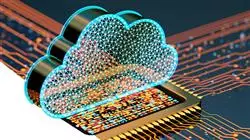University certificate
The world's largest faculty of information technology”
Introduction to the Program
The contents of this qualification are not classical subjects. This program specializes computer scientists in the application of the technologies of the future"

The Masters Degree in Research and Innovation in Information and Communication Technologies develops a highly specialized vision that will allow students to focus on advanced technological projects using the most innovative technologies in an appropriate way, generating a differential added value through their correct use and application.
The direct application of the knowledge acquired on Smart Cities, Blockchain, IoT, Digital twins in AI (artificial intelligence) in real projects is an added professional value that very few professionals specialized in Information and Communication Technologies can offer.
Professionals who successfully complete this program will have a global vision of the application of the different technologies involved in global digitalization and will have the ability to apply them, having been trained by accredited professionals who use them in their daily work.
Additionally, the student has the best study methodology 100% online, which eliminates the need to attend classes in person or have to comply with a predetermined schedule. In this way, in just 12 months, you will deepen your knowledge of the scope of application of each technology, understanding the competitive advantages they provide, so you will be positioned at the technological forefront and will be able to lead ambitious projects in the present and in the future.
Addresses the 6 most innovative technologies of today from a practical and innovative business perspective"
This Masters Degree in Research and Innovation in Information and Communication Technologies contains the most complete and up-to-date program on the market. The most important features include:
- The development of case studies presented by experts in Research and Innovation in Information and Communication Technology
- The graphic, schematic, and practical contents with which they are created, provide practical information on the disciplines that are essential for professional practice
- Practical exercises where self-assessment can be used to improve learning
- Its special emphasis on innovative methodologies
- Theoretical lessons, questions to the expert, debate forums on controversial topics, and individual reflection assignments
- Content that is accessible from any fixed or portable device with an Internet connection
Contemplates the newest technologies and areas of study and the most disruptive and surprising practical applications that you can find in the field of information and communication"
The program’s teaching team includes professionals from the sector who contribute their work experience to this educational program, as well as renowned specialists from leading societies and prestigious universities.
Its multimedia content, developed with the latest educational technology, will allow professionals to learn in a contextual and situated learning environment, i.e., a simulated environment that will provide immersive education programmed to prepare in real situations.
The design of this program focuses on Problem-Based Learning, by means of which professionals must try to solve the different professional practice situations that are presented to them throughout the academic year. For this purpose, the student will be assisted by an innovative interactive video system created by renowned and experienced experts.
It addresses two of the fields with the highest development forecasts in the world of Artificial Intelligence, NLP and Computer Vision"

It deepens the Digital Twins, a highly competitive field with a high demand and for which there is a very high lack of qualified profiles"
Why study at TECH?
TECH is the world’s largest online university. With an impressive catalog of more than 14,000 university programs available in 11 languages, it is positioned as a leader in employability, with a 99% job placement rate. In addition, it relies on an enormous faculty of more than 6,000 professors of the highest international renown.

Study at the world's largest online university and guarantee your professional success. The future starts at TECH”
The world’s best online university according to FORBES
The prestigious Forbes magazine, specialized in business and finance, has highlighted TECH as “the world's best online university” This is what they have recently stated in an article in their digital edition in which they echo the success story of this institution, “thanks to the academic offer it provides, the selection of its teaching staff, and an innovative learning method aimed at educating the professionals of the future”
A revolutionary study method, a cutting-edge faculty and a practical focus: the key to TECH's success.
The most complete study plans on the university scene
TECH offers the most complete study plans on the university scene, with syllabuses that cover fundamental concepts and, at the same time, the main scientific advances in their specific scientific areas. In addition, these programs are continuously being updated to guarantee students the academic vanguard and the most in-demand professional skills. In this way, the university's qualifications provide its graduates with a significant advantage to propel their careers to success.
TECH offers the most comprehensive and intensive study plans on the current university scene.
A world-class teaching staff
TECH's teaching staff is made up of more than 6,000 professors with the highest international recognition. Professors, researchers and top executives of multinational companies, including Isaiah Covington, performance coach of the Boston Celtics; Magda Romanska, principal investigator at Harvard MetaLAB; Ignacio Wistumba, chairman of the department of translational molecular pathology at MD Anderson Cancer Center; and D.W. Pine, creative director of TIME magazine, among others.
Internationally renowned experts, specialized in different branches of Health, Technology, Communication and Business, form part of the TECH faculty.
A unique learning method
TECH is the first university to use Relearning in all its programs. It is the best online learning methodology, accredited with international teaching quality certifications, provided by prestigious educational agencies. In addition, this disruptive educational model is complemented with the “Case Method”, thereby setting up a unique online teaching strategy. Innovative teaching resources are also implemented, including detailed videos, infographics and interactive summaries.
TECH combines Relearning and the Case Method in all its university programs to guarantee excellent theoretical and practical learning, studying whenever and wherever you want.
The world's largest online university
TECH is the world’s largest online university. We are the largest educational institution, with the best and widest online educational catalog, one hundred percent online and covering the vast majority of areas of knowledge. We offer a large selection of our own degrees and accredited online undergraduate and postgraduate degrees. In total, more than 14,000 university degrees, in eleven different languages, make us the largest educational largest in the world.
TECH has the world's most extensive catalog of academic and official programs, available in more than 11 languages.
Google Premier Partner
The American technology giant has awarded TECH the Google Google Premier Partner badge. This award, which is only available to 3% of the world's companies, highlights the efficient, flexible and tailored experience that this university provides to students. The recognition as a Google Premier Partner not only accredits the maximum rigor, performance and investment in TECH's digital infrastructures, but also places this university as one of the world's leading technology companies.
Google has positioned TECH in the top 3% of the world's most important technology companies by awarding it its Google Premier Partner badge.
The official online university of the NBA
TECH is the official online university of the NBA. Thanks to our agreement with the biggest league in basketball, we offer our students exclusive university programs, as well as a wide variety of educational resources focused on the business of the league and other areas of the sports industry. Each program is made up of a uniquely designed syllabus and features exceptional guest hosts: professionals with a distinguished sports background who will offer their expertise on the most relevant topics.
TECH has been selected by the NBA, the world's top basketball league, as its official online university.
The top-rated university by its students
Students have positioned TECH as the world's top-rated university on the main review websites, with a highest rating of 4.9 out of 5, obtained from more than 1,000 reviews. These results consolidate TECH as the benchmark university institution at an international level, reflecting the excellence and positive impact of its educational model.” reflecting the excellence and positive impact of its educational model.”
TECH is the world’s top-rated university by its students.
Leaders in employability
TECH has managed to become the leading university in employability. 99% of its students obtain jobs in the academic field they have studied, within one year of completing any of the university's programs. A similar number achieve immediate career enhancement. All this thanks to a study methodology that bases its effectiveness on the acquisition of practical skills, which are absolutely necessary for professional development.
99% of TECH graduates find a job within a year of completing their studies.
Master's Degree in Research and Innovation in Information and Communication Technologies
The constant evolution and updating of Information and Communication Technologies makes it necessary for IT professionals to be always at the forefront of the latest innovations. For this reason, TECH has designed the Master's Degree in Research and Innovation in Information and Communication Technologies, a high-quality program that addresses the latest trends in the field and will provide you with the necessary tools to research and innovate in the area. In order to guarantee the best education, this program has a highly qualified teaching team with extensive experience in the sector. In addition, the teaching methodology is designed to be 100% online, allowing absolute flexibility to study anytime, anywhere.
A unique opportunity to expand your professional career
.
The Master's Degree in Research and Innovation in Information and Communication Technologies allows you to delve into areas such as cybersecurity, Big Data, artificial intelligence, Machine Learning and Blockchain. In addition, the program focuses on research and innovation, which will allow you to acquire skills to lead advanced technological projects and generate differential added value in your work.







